
E! Online has a new long interview with Kristen Bell focusing on her charity work and advocacy. It’s a nice look into the causes that she cares about, and given what I know about her I do think she’s genuinely concerned and wants to help. Bell has admitted that she feels things deeply, we’ve seen her lose it over sloths, and that seems to extend to her feeling empathy for others. (She’s also been open about the fact that she struggles with anxiety and depression.) Her husband, Dax Shepard, once said that she gave away literally all their things to local charities when they were in Cuba, down to their baby supplies and diapers. Bell told E! that she works with homeless charities and charities focusing on addiction because Dax helped her understand what it’s like to be an addict. He’s been sober 13 years now but he used to have a serious problem with drugs and alcohol. She also said that she tells her daughters that they’re no better than anyone else and that everyone should be treated well.
“It is the most important thing I am trying to teach. I am trying to teach my kids not be stunted by country lines, language barriers, or religious boundaries. And that all human beings, and everyone in the world is part of someone’s family and they should be treated as such. It’s so simple to get caught up in lines that divide us. Why are you different? I think it’s important to remind ourselves that we are all the same and everyone is doing the best they can with what they have…”
Kristen works closely with PATH—People Assisting the Homeless—an organization that supports those transitioning from living on the streets to moving into homes. “They have the ability to do ‘move-ins’ where you get the list of household items they need like a sofa, and a bed, pots and pans. My friends and I, particularly for birthdays, instead of having a party we go do a ‘move-in’. We will all be on an email chain and divide the tasks, ‘Okay, I’ll go to Goodwill, you go to Ikea’. And then we get to move a family or an individual in.”
In addition to her work with PATH, Kristen recently donated $10,000 to Sun Cedar, a nonprofit resource center and manufacturing organization employing past felons, recovering addicts and homeless people who are getting back on their feet.
Kristen further explained to us, “I have a particular affinity towards helping people who feel outcast whether they’ve made mistakes, like having past felony convictions or recovering addicts. My husband [Dax Shepard] is in recovery and is almost 13 years sober. And seeing the world through his eyes has really opened mine to knowing that it is a disease and nobody is choosing to drink more than others, they are doing it because of a variety of reasons and they deserve the attention of a mental health professional, and not the county jail or however else we’re choosing to pretend we’re fixing the problem.”
That was really nice and I like that idea of having parties where you do charity work with you friends instead of drinking, eating and chatting. It’s like a party with a purpose. Kristen recently Instagrammed this post to support Sun Cedar charity. She didn’t state how much money she donated, nor does she seem like the type to brag about it. In fact she doesn’t Instagram much.
As for addiction being a disease, I’m torn about it. I don’t think addicts are powerless like AA teaches, but I do believe it’s something that requires compassion and understanding. We never know what it’s like to be in someone else’s shoes. She’s teaching her children to be good people, to try to empathize and not to feel above anyone. You don’t often hear that from celebrities.
Incidentally a new trailer for Bad Moms just came out. It looks dumb but funny and is out July 29th.
photos credit: WENN.com



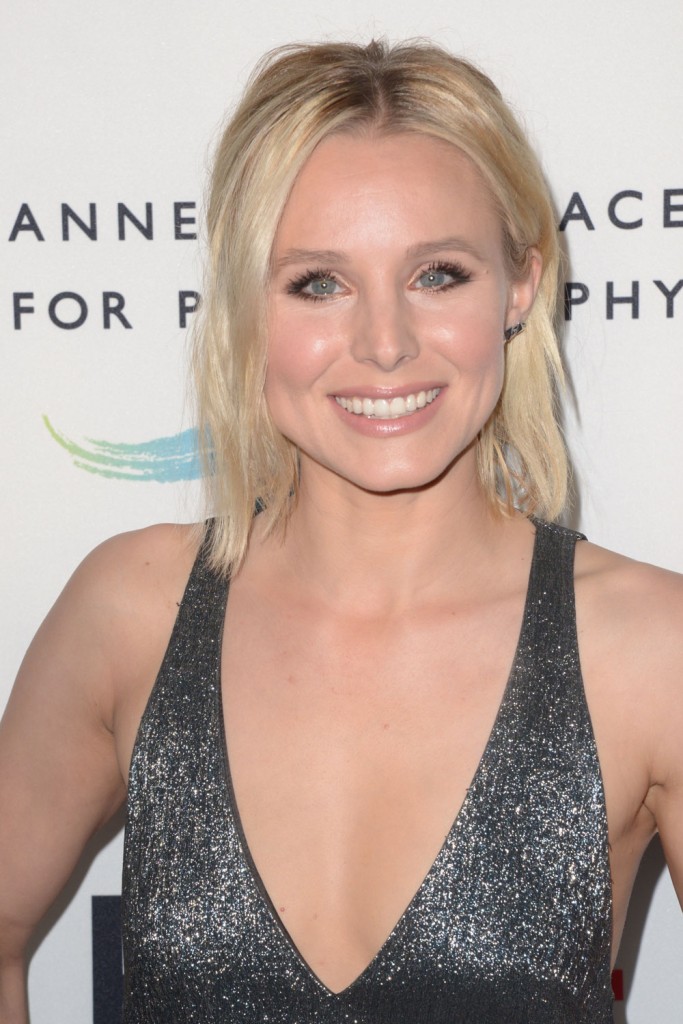






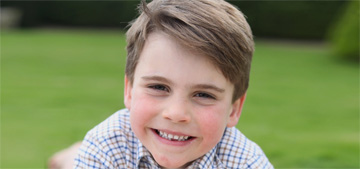
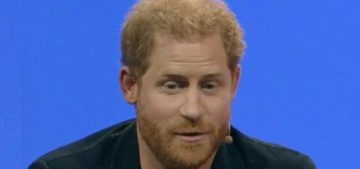
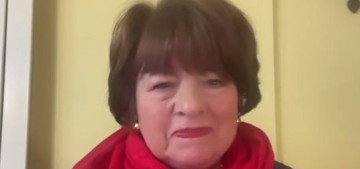
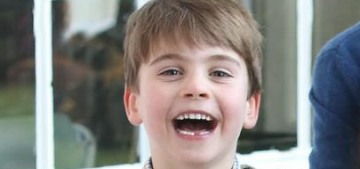





I strongly disagree. What most people don’t realise is that 90% of the research into drugs and addiction in the entire world is funded by NIDA who have a clear mandate as part of The War Against Drugs. They have decided it is a disease and so only find research that supports that view. There is compelling evidence that it is not. I saw a talk by Dr Marc David Lewis (a developmental neuroscientist and behavioural psychologist and former addict) at the Festival of Dangerous Ideas. He went through the definition of a disease and all they key factors something needs to be defined as a disease. Addiction doesn’t meet any of them. His most recent book follows various types of addicts over years as they struggle to get past their addictions. His information about how the brain works and addiction was fascinating. It’s in part about reforming neural pathways. You can’t do that to get rid of a disease but you can do it to rid yourself of addiction. Lots more research should be done into this. The rehab industry is a multi-billion dollar industry with dismal success rates that they won’t release. In part because it’s based on a faulty premise.
Thank you for this.
I strongly disagree too.
+1000
I work with people with addiction issues. I wouldn’t agree that addiction is a disease, but I would definitely agree that addiction is a mental health issue.
If you have ever known a true alcoholic well, I don’t think you so lightly dismiss the idea that it is a disease. No, it’s not a typical disease in that it invades your body through a virus or germs or causes cells to multiply for unknown reasons. But it is an unwanted and unintentional physical response that will eventually kill you, and it’s hard to find another word for that. And many people believe that you can cure other types of diseases with your mind. So you may be right, but one talk by a former addict with his own agenda doesn’t negate years of research necessarily.
GNAT….totally agree…
I don’t think it would be wrong for a layman to say that addiction is a disease, but if it doesn’t meet the scientific criteria for a disease then it would be wrong for scientists to classify it that way. I think it helps public perception to call it a disease because it makes people have more empathy and understanding for the struggles associated with addiction.
It is a brain disease. The brain of an addict doesn’t ever reach satiation like others do. It doesn’t know when to stop, resulting in blackouts and literally passing out on the sidewalk. Some may not agree.
Thanks for saying this GNAT. It’s a brain disease and should be treated as such, just like other mental health problems.
@GNAT thanks you for saying this.
@ a reader, it is a brain disease and it is something that some people are pre disposed to.
I had an alcoholic parent with some other mental health issues ( these brain diseases tend to go hand in hand) . These are diseases of the mind and they can be passed down as I too am an alcoholic in recovery for 3 years now.
You cannot tell me this wasn’t already encoded in my DNA. The trauma’s I suffered brought it to light but this is the only brain diseases I have had to battle and will battle for the rest of my life.
Thanks, GNAT. Addiction is, in fact, now considered a brain disease in the medical world. DEFINITION OF DISEASE: “a disorder of structure or function in a human, animal, or plant, especially one that produces specific signs or symptoms or that affects a specific location and is not simply a direct result of physical injury.” I was recently talking with a psychiatrist who specializes in treating addiction and his exact words were: “IT’S A DISEASE.”
THIS. As a member of Al-Anon, the sister group to AA, I have learned that alcoholism and drug abuse is a disease. Before, I believed it was a choice. But did my mom choose to get blasted before driving her beloved, small children home in a vehicle? She’s a loving woman. A wonderful mother. Sober, she’s horrified she did that when my brother and I were little. She’s horrified she drank herself into oblivion every night. She WOULD NOT if she COULD NOT. My mother is still an active drinker and believes she “needs” wine to live. I love her, and I respect her choices…knowing they are part of a diseased thinking pattern. She will get help when she wants help — if ever. She’s 73 now.
The only thing I need to know to inform me that alcoholism is a disease is this: no one, as a child, says, “I want to be a hopeless, out-of-control train wreck when I grow up.”
Thank you. Additionally that sort of thinking invalidates the hard work that recovered addicts have put in to get and remain clean. There is definitely an impulse control component, and a mood disorder would absolutely put you at hire risk. But addiction isn’t something you ‘catch’ like a disease. There has to be a combination of factors that create the perfect storm, but at the end of the day it comes down to personal choice.
It isn’t that simple and I would think you of all people would get that. Yes, it’s a choice – do I pick up that drink or that needle today or don’t I? No one can make that choice but you. And I get that you need to own that in order to keep making the right choice, and why you are offended by the idea that you have no power over it. But I think that while you DO have power over the choice, you do NOT have power over the fact that the choice is harder for you than it is for me. You can’t help that. I’m not making excuses for people who make the wrong choice or who are defeated by the overwhelming need for the drug. I’m just acknowledging that they didn’t do anything to deserve to be in this position, or at least anything more than I have done myself. I’m just lucky that I don’t have the disease that would have made my behavior and bad choices result in a life long struggle. I don’t see anything wrong with acknowledging that.
A disease doesn’t have to be something you ‘catch’. It can also be a long process of alteration of genes or cells for various reasons. Impulse and mood control by being more aware of your thoughts/mind and related actions are actually part of the recovery process for addicts, but even if you manage that, you are never cured, and have to be highly alert for the rest of your life. I believe personal choice plays an important part in most diseases, not only regarding the way and speed in which they develop over a longer period of time, but also in the way we adress them when manifested. Not just with addicts. Most diseases require hard work if you would want to cure them (not just fight symptoms), or at least put them in a ‘sleeping’ state. Only with addicts, we seem to think they just don’t work hard enough, because we can’t find a logical reason why anybody would want to go there in the first place, or again when relapsing.
YES +1,000,000 GNAT & Siri
It is that simple, you can’t stop doing harm to yourself and others. You need intervention from the medical community to stop before you die from drinking because you cannot choose to stop once you pick up that first drink. Lots of components are needed to keep away from that first drink.
Would you say the same about any other “brain disease”? I have fibromyalgia. Endless pain without cause or reason. Now people are starting to understand it, and call it a disease, some years ago, it was called being crasy or a lazy liar.
I saw students, colleagues, friends and relatives struggling with depression, mental illness, and yes addiction. None choose that.
I hope for them, that soon, medicine will be able to show some kind of image, pinpoint the cause and say here is the decease, so those suffering from addiction will get help without being judge by morally superior beings.
@SKF- I agree with GNAT, you can’t throw away years and years of research based on one person saying it’s not a disease. While I am not going to discredit his work, I am not going to say his work is the definitive answer either. Drugs and alcohol alter your brain chemistry and for many, it’s permanent. It’s a battle for many recovering addicts that never ends. They are not cured, so in that respect, it is a disease.
@Noname @siri @ GNAT
You are all the best!! It’s so nice to come to a forum where everyone is so respectful and understanding and ON POINT!!!
Sending you happy Canada day and Merika day hugs all around!!
I agree that it’s not a disease, per se, but I do understand if this language was possibly used to convey the seriousness of the condition. I think what’s needed is for people to take the word “addiction” seriously, and not just assume it’s a test of willpower.
ETA: Agreeing with @noname above, there is a change in the physiology of the brain after a while.
Yeah, the disease angle of addiction is something I have always found as self-victimizing and designed to take away people’s responsibility overall “I can’t help it; I have a disease.” Years will be wasted without getting the right help because people will renounce responsibility, accountability and free will. Meanwhile the addiction will get stronger because people are being encouraged to think they’re powerless to stop it. It’s really easy to not touch substances. A disease is something that simply appears without your knowledge. That’s not how addiction works. I argued with a cousin one time because she was comparing her drug addiction to CANCER. “People need to stop judging me! I have a disease! I’m no different than a cancer patient!”‘THE NERVE!! Betch, cancer patients don’t steal money from their families and use it to go raves at nearly 30 years of age.
No one is saying that alcoholics have no responsibility in their behavior or in the choices they make about whether or not to get help. People are saying that no one can help it if they HAVE the disease. What they do about it is up to them, of course. I had breast cancer and I have absolutely no problem with someone comparing it to alcoholism. Your judgmental and self-righteous attitude doesn’t help anyone.
The ENTIRE premise of the Twelve Steps is taking responsibility and accountability for one’s actions. In context, Admitting powerlessness means that you have gotten to the point in your drinking where you can no longer stop without help. The book even says “perhaps there was a time when the alcoholic could have done an about-face and changed their habit” Even AA doesn’t claim that addicts are doomed from the start. That doesn’t mean people don’t deserve help when they need to stop.
I’m an an alcoholic and I don’t know if there is a way for me to drink safely again so I choose abstinence. It doesn’t seem worth the hell I was in before to try and have wine with dinner. And no. At a certain point Drinking wasn’t a choice anymore. You don’t understand why you’re picking up a bottle when everything inside of you is begging you not to. And then, even eventually there’s physical addiction- and no doctor is going to claim that isn’t real. That begins driving your behavior.
I don’t expect anyone who hasn’t done addiction work to know these things but it would be wise to understand something before you go off and attacking it on false pretense.
“It’s really easy to not touch substances.”
Wow. That is…wow. The callousness and lack of understanding is appalling.
“Years will be wasted without getting the right help because people will renounce responsibility, accountability and free will.”
I take it you’ve never had a loved one suffer from addiction and get treatment for it, because that is not at ALL the way it works. Educating addicts and helping them to understand that addiction IS chronic and that they will be an addict for life is essential in assisting them in disease management. Most addicts aren’t born with the same coping mechanism as you or me. Treatment gives them the tool box which includes tools to manage their disease and prevent relapse.
People get so weirdly hung up and sanctimonious about the word “disease” like “Cancer is a disease! Addiction is NOT cancer!” No it’s not, and nobody is saying it’s the same as cancer. But yes, it is still a disease, disease being an extremely broad blanket-term that can be used to describe a variety of physical and emotional disorders or ailments.
Mostly, the lack of empathy towards addiction and the stigma attached to addicts is just…shocking and really repulsive. It’s just incredible how people get a free pass to make all kind of assumptions and stereotypes about addicts. Sad, really..
It appears that people who aren’t addicts aren’t fully understanding the “disease” pay off it. Just like the”powerlessness” noted in the article. Both are not ways to release blame or responsibility at all.
Once someone who is an alcoholic has a drink, they lose the choice to stop drinking until they pass out. Their brains are different and those who are sober (which is more than simply not drinking), should be commended for their hard work in staying sober. Its not nearly as simple as choosing to drink alcohol or not.
Thank you guys for explaining this with better words. Too many people speaking here with absolutely zero knowledge or understanding. I just could not.
There is another pattern of behavior that is typical of those surrounding addicts. Often those folks are a lot sicker than the addict, emotionally. Imma *got that with kanye and just can’t stop* get back to you with some information.
Thank to GNAT and Kitten for all the good you do in educating others on these threads.
Annie, if you’re post is genuine, your comment came off as rather thoughtless and unkind, but at the same time I can understand your feelings. Aabout fifteen years ago, I “broke up” with my best friend because I couldn’t deal with her behavior during her drinking binges and the drama that came afterwards. She, too, would often excuse her drinking by using the same words as your cousin. She seemed so selfish and glib about her actions, no matter how much hurt and pain she caused to others (she was an obnoxious and spiteful drunk). It made me so angry! I know the loss of my friendship effected her deeply. Not only did she lose a good friend, but I was one of the only people who would try to support and understand her behavior. A few years later she unintentionally killed herself and her young daughter in a tragic, stupid, f*cked-up accident that should have never happened. I learned from the news stories covering the deaths that she had been going to AA. So she had finally stopped excusing her drinking and admitted she had a problem. Now, whenever I think about her, I can’t help but wonder if I had remained in contact with her, I would have been there, supporting and celebrating any small step she made in recovery, and maybe their deaths would never have happened. In spite of all the sh*t she put me through during our friendship, I loved her– when sober she was witty and clever and kind. Her daughter was beautiful and smart. But the point is, I’ve been where you’re coming from. I thought the same things you do. I’m sorry your cousin hasn’t taken steps towards recovery, but if she ever gets to that point please give her the support she’ll need to be successful.
I strongly disagree with you, being a scientist and knowing that your first premise is wrong “addiction in the entire world is funded by NIDA”. Uh? Is the USA the entire world? That doesn’t even make sense. Most research in Europe on drug addiction is actually mostly supported by university and communitarian funds and they have no saying in the implementation of any research plan. There is strong evidence that there are genetic and biological factors in addiction. The neuronal network of addiction is one of the best known! To totally dismiss it as a disease at the light of all the existing findings because one person gave a good talk on saying the opposite is at the least strange.
@Chaucer: I don’t think it invalidates at all the hard work from recovering addicts. There are many classical diseases that can be fought with hard work and restriction of a lot of behaviours (diabetes?!). To better understand addiction, it’s aetiology, neuronal networks and physiological components involved can only give better weapons to fight against it and might also help addicts to understand why they might have a harder time keeping away from some behaviours than other people.
Edit: @ siri
just saw your comment after posting. totally agree with you!
NIDA does fund the large majority of drug addiction research worldwide. Here’s a press-release from NIDA themselves saying they fund “more than 85% of the world’s research” http://archives.drugabuse.gov/newsroom/01/NR7-19.html Admittedly, that’s from 2001. I couldn’t find a good recent link/statement. It may have dropped a little, as some of the non-Western countries have started contributing to local research (Saudi Arabia, parts of Asia etc) but I doubt it’s dropped by much.
That said, it doesn’t automatically make the research suspect. I’m from Oz, and my local uni takes NIDA funding to do drug-research, even though we tend to work with a European-style harm-minimisation model rather than the American-style disease model. Of course we’re going to apply for a NIDA grant if they’re waving money about. It doesn’t mean the research design is compromised in any way. When it comes to funding, NIDA is pretty even-handed – they’ll fund anyone. If there’s a bias problem, it’s in the journals who decide what to publish, not with NIDA deciding who to fund.
Alcoholism like a defined disease… Is like trying to define human sexuality in silos also..
It’s different for any individual involved. Also like labour.
I like her politics, and I’m a big Veronica Mars fan. But the sloth film was uncomfortably fake – she did not appear to shed one tear. She and Dax are smug.
She seems genuine! I admire her…
I’ve said this before, but I think alcoholism is a disease that some people are vunerable to and some are not. I certainly abused alcohol for years in college and afterwards – I married an alcoholic – but I was just lucky that I didn’t become physically addicted. My body would not allow me to continue drinking past a certain point. If I was hung over, for example, the smell of alcohol the next day would gag me.
As for the higher power, I think you can look at it two ways. The higher power could be God or whatever you think of as God, but it could also be something that’s already within you. You just have to access it. In other words, you are helpless until you find this power to fight with.
I’m 12 years sober. It wasn’t until I accepted I was powerless over alcohol that I was able to get sober and stay sober. I cannot drink alcohol like a non-alcoholic. It’s not an option for me. Is alcoholism a disease? Yes, I think it is. But I don’t care if it’s labeled a disease or not. All I know is I’m an alcoholic and I cannot drink alcohol.
That’s a great explanation.
Congratulations on 12 years sober!
Thank you for your responses in this thread, GNAT.
Yes addiction is a gene literally passed down the family tree. If you have that illness but never touch alcohol or drugs then obviously that part of your brain won’t trigger… But chances are there is something else that could be taking there place that you are addicted to and can’t stop. For those who can pick up and put down alcohol with no ease or have never experienced a loved one w a true mentally facilitated addiction, they will never understand. It’s the I can do it so everyone else can too mind set. What people don’t realize is that these addictions/diseases are also closely linked with mental health issues and one can trigger the other, making the control on ones own nearly impossible without proper treatment. Do people think depression, anxiety, ect. are all excuses? They are all problems that stem from the same part of the brain as addiction. Genetics plays a huge factor in all of these, although their are always exceptions. There are always people who could truly quit and just choose not to, but don’t get them confused with true addicts, there is a huge difference & it is obvious if you have witnessed it.
Please tell me exactly which gene carries ‘addiction’. I’ll wait….
This has never been proven and an addiction ‘gene’ has yet to be identified, so please stop spreading misinformation. Here are two quotes from NIH:
“The moderate to high heritabilities of addictive disorders are paradoxical, because addictions initially depend on the availability of the addictive agent and the individual’s choice to use it.”
“Addictions show no clear pattern of mendelian inheritance and their complexity is poorly understood,”
@rosettastoned: There isn’t a ‘gene carrying alcoholism’, but there could very well be a genetic predisposition for the way mechanisms are triggered when drinking.
https://www.niaaa.nih.gov/alcohol-health/overview-alcohol-consumption/alcohol-use-disorders/genetics-alcohol-use-disorders
I think it’s rather a matter of “gene expression” or triggering of genes- and that is influenced by many factors, including lifestyle choices, and social factors.
http://www.dailymail.co.uk/health/article-2859423/Alcoholism-genetic-Scientists-identify-key-DNA-makes-people-vulnerable-addiction.html
http://www.medicaldaily.com/alcoholism-genetic-scientists-discover-link-network-genes-brain-312668
Wonderful comment! To find that higher power inside of you, and make it your new best friend is crucial to have the strength to make good choices for yourself. Of course it is also true that with many addicts, there can be a long period of self-victimizing prior to that, and that’s why I personally believe outside help is needed to get one out of this vicious circle of self-blaming, drinking, self-victimizing, and drinking again.
I disagree. It IS a choice.
I’ve seen too many tragedies and heartbreak from people (including relatives) who regularly turn to the bottle knowing the carnage that will ensue.
But not caring, cause they also know they will be excused and taken care of.
That’s just so wrong. Does it ever occur to you that they turn to the bottle knowing the carnage will ensue because they can’t help it? Because they are physically addicted to alcohol? Because, unknown to you, they tried to fight it for days, weeks, months, even years and it was so powerful that they lost the fight again? Why would someone make that choice? It’s so easy for you to say it’s like choosing between items on a menu, but that’s just not how it is.
Hear, hear!
Of course it is a choice. Nobody is forcing anyone to take the first sip. People choose to drink and do drugs, they are not born addicted (unless the mother was using while pregnant) or got “infected with the addiction virus”. It is possible to live without alcohol even in social settings. It’s a question of willpower. But if you choose to drink you KNOW that there is a risk for becoming an addict since alcohol IS A DRUG and everyone knows that there is something called alcoholism or even has alcoholics in their family.
@GNAT
No it’s not easy for me to say.
We disagree. I call it as I see it.
They often do not fight it alone, and still the brutal after effects of their choices are felt by all, including the innocent.
@Zip- There is always the choice to use or not use the very first time, that is true. But no one chooses to become an addict. No one. It’s not a question of willpower, either.
@Jegede- I call it as I see it, too. And how I see it, it is not a choice to be an addict. Both Zip and you can sit there and judge others for their choices in their life, I’d rather show compassion and see what it is I can do to stop this epidemic from claiming additional lives.
@Jegede
No one denies that alcoholism affects and devastates the whole family. But that family also has a choice – to continue responding the same way over and over by enabling the behavior or to end the relationship. My first husband was an alcoholic, and it tore us apart. It led to infidelity, abuse, and all sorts of emotional horrors. Eventually, I chose to leave. I told him to get help or I would go. He tried. He didn’t drink for four days, and I believe that was extremely hard for him. But in the end, he chose alcohol and I chose to stop being a victim. I still remember the young man I fell in love with. No one decides to become what he became. It was ultimately, his choice, I agree. But he wasn’t strong enough to overpower the disease, and someone doesn’t choose to be in that position.
@Zip
And what planet do you come from? The one where a 18 year old says, no, thanks, I won’t try a beer. It’s a drug and I might end up as an alcoholic like someone I heard about? Please. Let’s try to be somewhat realistic.
@GNAT and others
Hi! I’m 21 (turning 22 in December) and I have never had a drink in my life. No cigarettes, no pot, no alcohol, no nothing. And it wasn’t that I wasn’t exposed to the possibilities. My family’s not religious or anything, so that’s not the reason. I attended a public university known for “party culture” too. I also attended a boarding school during high school (a fancy schmancy prep school on the East Coast where 1/3 of my grade was kicked out for getting caught with alcohol and/or pot).
Just my two cents:
My parents were social drinkers but lately they’ve stopped altogether. My dad was a heavy smoker up from when he was in his teens until I was about a year old (when he was in his thirties) and then he quit cold turkey. I do think we have a strong genetic predisposition to addiction (as well as depression and other mental health issues) in my family, but we somehow have managed to turn that into positive pursuits. Somehow. Either we’re lucky or very disciplined, according to whichever view you have. And my parents are the best! I grew up in a very safe and loving home that emphasized academics.
My younger brother, on the other hand, has recently gotten into…well, he’s just gone down a very dark path that we haven’t been able to do much about. It’s sad, but we feel this kind of helplessness and cynicism about it. There’s not much we can do without losing ourselves in the process. So we let him move out and just do his own thing, because he won’t listen to us, no matter what we try. My parents are obviously heartbroken, but…and this might sound heartless…I kind of have this mindset that my younger brother, my real brother, he died a long time ago. This….person. This stranger. He’s not him. He’s a monster. And it was his choice. I have the same genes as him. I have the same parents as him. We have had all the educational opportunities in the world. I’m going to medical school; he was going to college in a very prestigious engineering program. And look at the choices he made.
Because of this, I obviously am sympathetic to alcoholism and addiction, but just through anecdotal evidence – there are plenty of people who never drink. My friends don’t either. A good deal of the people I know don’t drink or do drugs.
I guess it is as they say – a combination of genetics and environment. I don’t know how to fix any of this but I do think the cultural emphasis on alcohol and drugs, equating them to having a good time, is flawed and, as a prophylactic measure, we should target that in trying to decrease this overarching problem. But of course that’s not the only thing. What can we do?
Alcohol has been around for millennia, as have opiates and other drugs. It’s part of being animals, being human. We are our wiring. We are products of evolution. Some of it can’t be helped. But we are also products of our surroundings and culture. I like to think that that’s more important, that we are more than brain chemicals and nature’s fate. We are human because we have the power to make decisions and we are not beholden to baser animal instincts. We can transcend. And that’s why I (from an obviously biased perspective) think “disease” is….an easy way out. It’s easy to label things.
Look at me. I’m a jaded millennial.
Couldn’t agree more.xo gnat.
No, KHLBHL- you’re not a jaded millennial. You’re just young. People’s perspectives change with time, based on experience.
@KHLBHL
I don’t know how to answer you without sounding condescending or unkind, and I really don’t mean to. It’s good that you have never had a drink or a cigarette and all that, and it’s your choice. But you have no idea what you’re talking about. You don’t even really make sense. One doesn’t turn depression or a “predilection” for it around through discipline. You may share genes with your brother and have the same upbringing, but that doesn’t mean you are clones who will make exactly the same choices. You seem to feel far superior to your brother because of your “discipline” and wonderful choices. It sounds like his role in the family is screw up and yours is miss perfect. I feel really sorry for your brother. I think you will face some huge comeuppances in life and you will discover that all of the good things that have happened to you are not because you are so wonderful. You’ve just been lucky. I think you will look back on your attitude from this post one day and be embarrassed. As you should be.
I disagree, nobody chooses to destroy their lives, their liver, their family.
agree with cynthia. I didn’t think i would be taken care of or made excuses for my actions.
I can tell you honestly that I would have a limb removed to be ensured to never ingest another addictive substance again. Many people who have lived through this would probably agree.
It is a hell that is unimaginable. A dear friend of mine said that cancer wasn’t shit compared to this.
The sheer callousness and ignorance of most of these comments is astounding. As as recovering addict with two years of sobriety, I’d have to agree with some on this thread and disagree with many. For me personally, all it took was a one time trip to my own personal rock bottom to find salvation. For others, death was not enough. Addiction is the very definition of insanity; insanity is classified as a disease. If you repeat the same actions and expect a different result you’d be classified as insane and thus be mentally ill, and so, by that logic, most addicts and alcoholics have a mental illness, one they will struggle with for the rest of their lives
Congratulations on two years sober!
Congratulations on your recovery! I think sometimes seemingly harsh comments might come from people who’ve suffered at the hands of addicts – maybe people have been beaten by an alcoholic, or bullied into handing over money by a heroin addicted relative – it’s difficult to expect much compassion from people who’ve been badly hurt.
But I think most people can cheer on people who are truly dedicated to getting and staying sober.
I agree with you. It is a disease! And I’m really upset with the comments of the author and readers. I thought this was an educated group. I’ve worked in healthcare and with addicts and to deny the truth is simply ignorance. I wish you all the best in your future. Congratulations on kicking addiction in the ass these last two years.
I watched my father drink himself to death. It was not a choice. Trust me no one would openly chose to do that to their body. I still wake up in the middle of the night to his screams. Have you ever cared for someone who is dying? Have you ever watched someone die? When you are in deep stages of physical addiction, you do not have power over anything.
I admire these two and they are just sweet together.
I’m torn, too, on alcoholism/addition.
I’ve seen really good people get swept up and ruined who do inexplicable things.
Can addiction contribute?
Absolutely.
But I don’t think anyone can blame addiction for all of their actions.
Committing evil has to come from within on some level.
But I’m for supporting recovery and forgiveness to some extent.
I’m more supportive to people owning what they do.
I don’t support blaming “addiction.”
And I love that she teaches her kids that they are no different from anyone else.
We were all born in to whatever circumstance for some reason.
Some more privileged than others.
I’ve often wondered why I was born in the US and afforded the ability to make a good life for myself and my children and why others are born into a life of famine and danger.
What to do with that?
Wonderful to teach our children to acknowledge and respect this and work to make a difference.
She will forever remain frozen in time for me for her incredible performance in Gracie’s Choice.
What a gifted actress.
Nice to know she brings that same passion to her real life.
I like her. Former addict here-I DESPISE the idea that addicts are powerless and all that crap. It’s a solid way to coddle and remove accountability and that reasoning is used to make addicts feel like it’s not our fault so we don’t feel ashamed for seeking treatment.
Every time I stuck a needle in my arm it was 100% my own doing. Nothing and no one forced it but me. Every bad decision I make is my choice. That’s accountability and responsibility. Don’t take away my power.
Wow, Chaucer!
Your post gave me goose bumps.
Incredible what you share and I applaud your accountability.
Congratulations on owning it and overcoming it as a result.
Well said.
@ Chaucer- Most addicts in a 12 step program also take responsibility and hold themselves accountable for their actions, too. No is taking away your power.
+1 Admitting that you are powerless over alcohol– that you absolutely cannot drink alcohol like a non-alcoholic– does NOT mean you don’t hold yourself accountable and take responsibility for your actions.
Chaucer, thank you for this.
former addict here too. The powerlessness is not over life or choices. It’s powerless over the decision to use once you take the first sip/hit whatever. The program never says that you’re not accountable (hence the 9th step). It’s ONLY meant to be powerless over the addiction once you use. Once you stop it’s considered your responsibility to set up your life so that don’t make the wrong choices. The powerless stuff is a way to counteract the notion that if I use I can control it this time and it’ll be ok.
I agree with you. And having worked around and dealt with addicts of various stripes, yes there ARE some people who use the word disease as an excuse “I can’t help myself”. I’ve also known many recovered addicts, especially alcoholics, so I KNOW people can stop drinking or drugs if they really, truly want to do so.
As an alcoholic, who recently relapsed after getting sober a few years ago. I really needed to read that. Sometimes people can make you feel like you’re just weak and worthless. I understand that people who don’t have issues with addiction can be confused by this disease. Do I think i’m powerless? when it comes to alcohol, i think i am. I just couldn’t believe I “went back out”, I started to think i could drink like everyone else, and maybe I did for a bit. But the downward spiral leaves you soulless. Never went to rehab before. But I am considering it, because how much worse can it get? No shame in admitting you need help. (well always a little when you are the one asking), OK. enough ranting on about personal issues on a gossip site, but just felt like commenting.
See you in 30 days celebitchy.
i like kristen. the no kids policy was annoying (i dont recall ever seeing a picture anyway) but i can’t hate on anyone who custom makes Game of Thrones Tshirts.
Good luck to you, ladylove. You got this.
The disease part of addiction comes from the inability to handle pain. It is well known that addicts have low serotonin levels relative to non-addicts. This could be due to family genetic history or childhood abuse. Which means that they are not capable of choosing otherwise. They need to learn to actively increase their serotonin on their own through for example exercise and meditation. This could be a daunting task at times.
I think that the disease language is good for 1 thing– medicalizing the issue. More insurance companies are willing to extend coverage to those receiving methadone, going to rehab, seeking therapy as a result of the disease category.
However, I agree with the notion that it’s a disorder. A disorder that, just like anxiety, ocd, and depression, can kill you. The idea of choice alone completely ignores the neural, psychological, and physical components.
For those of you who one day “chose” to not use, congrats! You are a minority! I don’t choose to stay up at night, obsessively worrying. I don’t choose to be An unpopular introverted weirdo, stressing about the smallest most insignificant things. I dont choose those things. I do choose not to seek help. I can’t afford it. At the end of the day, because of our abysmal mental health industry, my disorder can be classified as a lifestyle choice. Doesn’t that free me? Doesn’t that free you? I don’t f*** know
You make an excellent point.
In my experience, alcoholism often gets reinforced by toxic life circumstances or perhaps even attempts to self-treat some anxiety and/or depression. Just like how one can get addicted to anti-anxiety meds, but I don’t know if that means the benzos or alcohol are addictive substances for everyone after just one or two or a week of uses. I think it’s important to understand that anxiety and depression are extremely uncomfortable things for any human to experience and I understand that the brain creates compulsions to escape those intrusive thoughts.
Someone described it to me like when you see a bear in the bushes and you want to run away – that’s anxiety, and it’s a powerful brain-based cascade which can make us do things we never thought we would do.
I agree, compassion, love, therapy, time, and often complete life rearrangements are necessary and not all will be able to drop alcohol or other substances because not all will have those personal or monetary supports. I like it when countries treat alcoholism as a social ill rather than an outright crime and focus on getting some help for people.
The NYT wrote an article a while back about treatment programs teaching moderate drinking with extensive therapy, I wonder what the long-term outcomes of that treatment style will be.
As a psychiatrist, I don’t necessarily agree that addiction is a disease. Addiction is an extreme response to a stimulus. I think there are people who are hardwired for addiction and there is likely a genetic component involved. I believe in the addictive personality. I think of addiction as a disorder. It is very real, it is very debilitating, but yes, it is initially caused by choices made. If someone chooses to drink, for example, and they happen to be a person with an addictive personality, they are more at risk to develop an addiction to alcohol. That’s why “gateway drugs” are not gateways to harder drugs for most people, but can be (and are likely to be) for those with a predisposition to addiction. It’s like the addiction remains dormant until a potentially addicting stimulus flips the switch and turns it on. An addict is never “cured” – that predisposition is always there, but it can be controlled. Many of those with addiction issues simply replace one addiction with another. The trick is to find a healthier replacement behavior.
Please keep in mind that I am not talking about the physical dependence that certain drugs have on the body, I am talking about the mental addiction component. The physical dependence on a drug, while difficult to break, is possible through detox. The addiction, however, is harder to break.
thanks for this comment, very interesting and I appreciate hearing from you.
” Addiction is an extreme response to a stimulus”
I agree. I think for people to understand addiction in terms of “diseases” it can be in part compared to an allergic disposition. Most people´s immune system will not overreact when exposed to a normally harmless allergen, but for some it will, sometimes in quite dramatic ways. The best way to avoid this extreme reaction is to avoid the stimulus, but the unfortunate difference here is that there is no mental and/or physical addiction to the stimulus with allergies.
The comparison with an allergy is very thoughtful. When some addicts have been sober for a long time, and then drink again, the body sometimes react as if they drink a poison. Even if it was just a tiny amount, it can react with symptoms similar to allergies- itching, red skin, swollen tissue around the eyes, problems with the eyesight. This can also be triggered accidentially by using some mouthwash with alcohol, or eating Tiramisu without knowing there’s alcohol in it.
Doesn’t this comparison present a strong argument for addiction being a disease though? After all, it’s the same thing (a stimulus causing an extreme response), except in allergies it’s the immune system responding extremely, and in addiction it’s the neurological system responding extremely. (Reading over your comment, I think that’s your point actually lol; I’m confused a psychiatrist did not come to the same conclusion . . . honestly, some bad wording in paranormalgirl’s comment: “it’s initially caused by choices made” No, it’s triggered by choices, but the cause is the wiring of the brain. After all, many people choose to drink, yet only some are addicts. Allergies are triggered by an offending protein, but the cause is the malfunctioning immune system. I guess people just caused their allergies by wanting to eat food that everyone else was eating and go outside during ragweed season; shoulda stayed inside and not tried that shellfish, ya dummies!)
I think the issue is that for many people mental illness = not a real illness. Imo, we should just call them neurological diseases, since the brain is in fact physically different in so-called ‘mental’ diseases. That would probably help with the stigma. (I also think alcohol dependence is some people’s attempt to self-medicate diseases like anxiety and depression . . maybe they didn’t seek treatment because it’s not considered a real disease, and just some ‘weak’ people’s inability to cope with ‘stress’ (not my opinion).)
Your comparison was very adroit! Drew me to make my first comment.
I’m a recovering alcoholic, 7 years sober, and I tend to think of my alcoholism as a disorder–the same as my severe chronic depression is. But if I were going to choose only one or the other to classify as a disease, I would say it was the depression, not the alcoholism. This is b/c my depression, while controllable within some range, to some degree, w use of an antidepressant (I wouldn’t be alive w/out one, literally) is pretty much, otherwise, completely out of my own hands. It is incapacitating on some days, merely restrictive on others, but always, eternally, omnipresent, knowing my weaknesses better than I know myself. This depression can worsen and spread suddenly and quickly as a next heartbeat, no matter that I always remain on my treatment. To me, that is more similar to a disease such as cancer, something w/out a full cure, w no true control or prevention, and a possibility of unpreventable death. It’s more like a disease than alcoholism or drug abuse, which *do* actually have cures: abstaining from the addictive source completely. While I know all too well that this is far, far easier stated than done, it *is* a certain cure, and it is within a human’s spectrum of personal choice to *be* cured–while severe and unremitting depression is not yet within a human solution. In AA, there is a saying: “I got tired of being sick and tired, so I quit drinking”–problem solved. However, there is no equivalent slogan for a disease, including depression. I am often, from my depression, sick and tired, but I can’t *choose* to overcome that, as I have no authority, no final word, in selecting how my neurotransmitters decide to behave themselves. I can be on my prescribed medication, in therapy, when suddenly, the often dormant, suicidal face of my depression will surface and revolve to gaze straight into my own helpless gaze, my own face, as to outstare me, and at such times, there is literally nothing I can do: I am pinioned by what I have come to consider a disease, a terminal illness. Conversely, I can and do conquer my alcoholism every day: it has a cure, however high its price feels, however hard won. I would do anything for such a cure for my severe depression– an invisible, invincible disease.
My dad is an alcoholic and it definitely runs in my family. I have always been careful with my drinking, and I find that I can quickly become “addicted”. Currently, I only have one drink a night, maybe two once a week. But I am addicted to that. I get extremely irritable and anxious until I have that one drink. So, I need to cut out drinking. So, yes addicts have a choice, but multiply that by 100, and you realize that to make the choice not to drink, or shoot heroin, for someone who is an addict, compared to someone that is not, is making the choice to overcome a lot of intense physical and mental pain. It is not remotely comparable to making the choice not to use a substance when you are not physically addicted to it. Just like if you have depression, you can’t just “buck up” and choose to be happy. People do have control over seeking help and remaining clean, so there certainly is responsibility, but the disease model recognizes that it is something that can require medical assistance to overcome.
” Just like if you have depression, you can’t just “buck up” and choose to be happy. People do have control over seeking help and remaining clean, so there certainly is responsibility, but the disease model recognizes that it is something that can require medical assistance to overcome.”
Exactly.
LOL I knew she is a Cancer. Textbook case–both the good (caring, empathic) and the bad (emotional moos swings). Hope she has studied literature on cosependency. It is easy for her to go there.
What “disease” forces someone to drink, spastic hand-to-mouth syndrome? Genetic predisposition to alcoholism? Absolutely. But the idea that it’s totally out of your control is a huge, huge cop-out.
It’s not a disease.
For some, it’s a genetic predisposition; for others, it’s behavior that’s worn a deep and not indelible, but, diffucult-to-rewire path in the brain (neurons). For others, it’s both.
You can wake up one day and discover you have cancer.
You don’t wake up one day with an addiction to heroin.
Don’t do drugs in the first place and you won’t have an issue.
Before you discover cancer (or are diagnosed with it), there’s a process of alteration of cells going on. And even then, for some people it might not manifest as cancer. But for some others, it does. You don’t really ‘wake up’ to it, although for the person in case it might look this way. Same with addictions- you actually never truly know until you use something. Here, too, for the person concerned it can be a moment of ‘waking up’ to this fact, although the preconditions were there already. A lot of alcoholics don’t even notice they have a problem for a long time, since many people drink, and it’s socially accepted and widely used, which can be followed by an even longer period of denial for many reasons. So the “Just say no!” would mean, they know from the start of their lives, that this could be big time trouble. Out of my experience, that’s mostly not the case.
What it all comes down to is SELF SOOTHING.
It becomes a security blanket, like a child who has been left in his crib much too long and neglected and is forced to sooth himself any way he can. That is addiction.
I think it is far to easy for ones to dismiss addiction as a choice. How wonderful it would be if it were that easy.
People need to take responsibility for their actions. It’s not a disease. As others have said, you can’t catch being an alcoholic. Every single drink one chooses to drink (or not drink) is a choice.
You don’t catch diabetes, schizophrenia, allergies, etc. either . . . not all diseases have an infectious etiology. Addiction is, by definition, when ingesting a substance does not feel like a choice: it’s compulsive. Like OCD, another brain disease. Man, if only agoraphobics could choose to start going outside, after all, it’s a choice everyone else makes easily enough.
I don’t know enough about addiction to weigh in on the “disease” issue, but I do just want to say I think Kristen is a very big hearted person, and always seems to be involved in causes that are important to her. I respect that, and I imagine she is raising her kids to do the same.
PATH and the move-in party sound amazing.
I skimmed through and haven’t seen a good explanation from the not-a-disease side that doesn’t sound like it’s blaming the victim. (Sorry if I missed one.)
I’m honestly quite shocked! I’m Australian, and we don’t use the disease model, but we also don’t blame the victim, or consider it a choice! No wonder most of you are so attached to the disease model if the only other option is “you’re bad/weak”.
I learnt several models of addiction:
Moral Model – Views addiction as a sin or a moral weakness.
Disease Model – Argues that the origins of addiction lie in the individual him/herself.
Social Learning Model – Suggests that dependence behaviours are learned, exist on a continuum and consist of a number of behavioural and cognitive (thought) processes.
Public Health Model – Drug use seen as the interaction between the drug, the individual and the environment.
Socio-cultural Model – Argues that substance abuse should be examined in a wider social context and can be linked to inequality.
The moral model is useless, it doesn’t work (see prohibition.) The rest have pros and cons, and should be used where they fit best. The problem with the disease model is that – by definition – it denies the other factors and puts all the responsibility on the individual going cold turkey. That works … sometimes. If the user is mentally ready to quit, and has a lot of support, then odds are better.
But what if the user doesn’t want to quit? Then the public health model is handy … minimize the risk: make sure alcoholics aren’t driving drunk, make sure drug-injectors aren’t leaving used syringes at parks.
And have you taken race/advantage into account? For example, the socio-cultural model suggests you first stop and question WHY jail terms for crack are harsher than those for powdered cocaine. (That’s the only American-context example I know off the top of my head. I’m sure there are more. In the Australian context the socio-cultural model attempts to explain/address some of unique problems with addiction in Aboriginal communities.) It doesn’t have to be race, there are distinct gender differences in what the community considers “acceptable” or “problematic” drinking. And age differences.
The disease model can’t address all that, it’s too focused on the individual. The individual is part of it, but so is learning and environment and culture.
I struggle every day to not use drugs.
I know I can’t control myself and will likely end up dead if I use drugs.
This is a torture I cannot begin to describe. To fight with yourself, nearly constantly, to not use drugs.
I do not feel like this is something I have control over.
It’s very exhausting and very scary.
I can’t trust my own brain.
It’s like I’m trying to kill myself.
That’s what being an addict feels like.